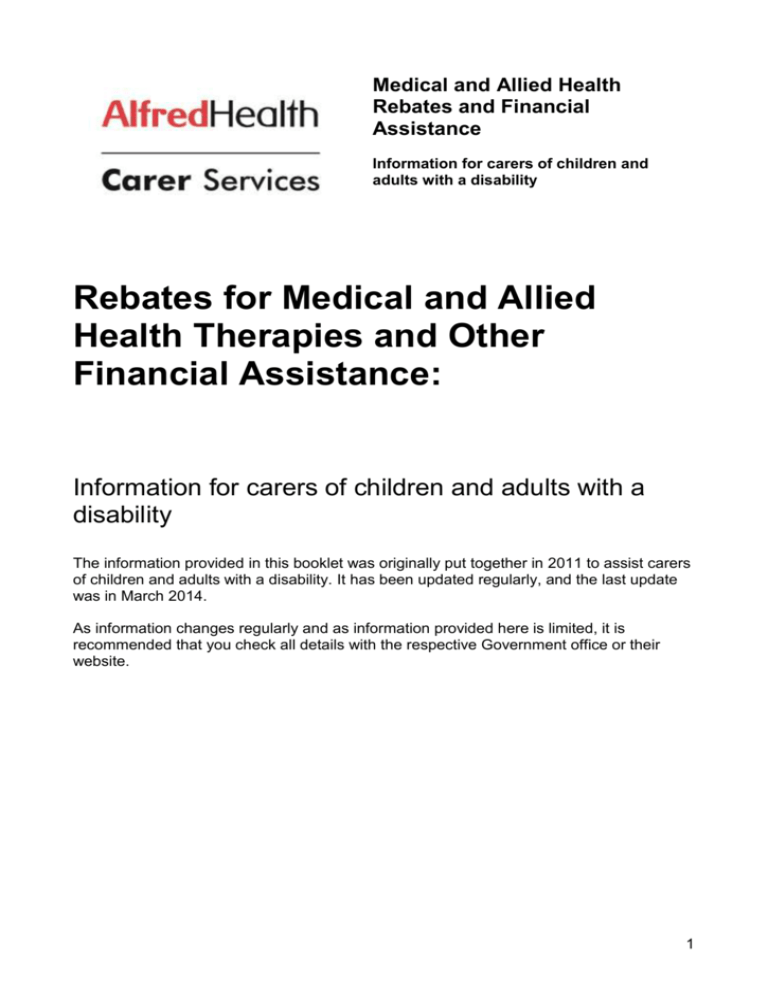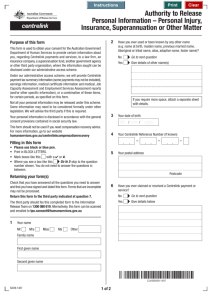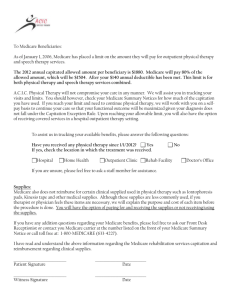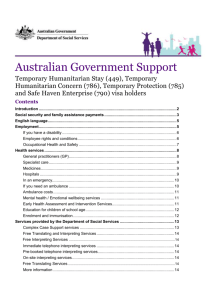REBATES FOR MEDICAL AND ALLIED HEALTH THERAPIES
advertisement

Medical and Allied Health Rebates and Financial Assistance Information for carers of children and adults with a disability Rebates for Medical and Allied Health Therapies and Other Financial Assistance: Information for carers of children and adults with a disability The information provided in this booklet was originally put together in 2011 to assist carers of children and adults with a disability. It has been updated regularly, and the last update was in March 2014. As information changes regularly and as information provided here is limited, it is recommended that you check all details with the respective Government office or their website. 1 Table of Contents Centrelink Financial Assistance _________________________________________ 3 Carer Allowance _______________________________________________________ 3 Carer Payment ________________________________________________________ 3 Carer Supplement ______________________________________________________ 3 Child Disability Assistance Payment ________________________________________ 4 Mobility Allowance ______________________________________________________ 4 Medicare Initiatives ____________________________________________________ 5 Medicare Safety Net ____________________________________________________ 5 Pharmaceutical Benefits Scheme (PBS) Safety Net ____________________________ 5 Chronic Disease Management Plan ________________________________________ 6 Better Access to Mental Health Care Program (GP Mental Health Plan) ____________ 6 Access to Allied Psychological Services (ATAPS) _____________________________ 7 Helping Children with Autism – assessment and treatment plan ___________________ 7 Helping Children with Autism – early intervention services _______________________ 8 Special note about early intervention services ________________________________ 8 Child Dental Benefits Schedule ____________________________________________ 8 Other initiatives and rebates ____________________________________________ 9 Better Start for Children with a Disability Program _____________________________ 9 Net Medical Expenses Tax Offset __________________________________________ 9 Child Care Benefit (CCB) _______________________________________________ 10 Approved Care _____________________________________________________ 10 Registered Care_____________________________________________________ 10 Grandparent Child Care Benefit __________________________________________ 10 Child Care Rebate _____________________________________________________ 11 Continence Aids Payment Scheme (CAPS) _________________________________ 11 Essential Medical Equipment Payment _____________________________________ 11 Other assistance _____________________________________________________ 12 Early Childhood Intervention Service (ECIS) _________________________________ 12 Flexible Support Packages ______________________________________________ 12 Short-term funding assistance – Southern Region ____________________________ 12 2 Centrelink Financial Assistance Carer Allowance Non income or assets tested, non taxed, supplement paid to carers who provide daily care and attention at home to a person or child with a disability or medical condition. A diagnosis of Autism Spectrum Disorder or Asperger’s Syndrome will meet automatic eligibility criteria. Other conditions such as intellectual disability and developmental delay rely on Treating Doctor’s Report. Provides a Health Care Card to the child, which is needed for eligibility to the lower Medicare Safety Net threshold. Can lodge an ‘intent to claim’ if in the process of diagnosis for the child. Contact Centrelink on 132 717 to begin application. More information can be found at: http://www.humanservices.gov.au/customer/services/centrelink/carer-allowance Carer Payment Pension type payment for carers of individuals with a disability. Income and asset tested. Contact Centrelink on 13 2717 for more information. Read the fact sheets on the Centrelink website at: http://www.humanservices.gov.au/customer/services/centrelink/carer-payment Carer Supplement Annual lump sum payment of up to $600 to assist carers with the costs of caring for a person with a disability or medical condition. Automatically paid to recipients of Carer Allowance or Carer Payment. Further information: http://www.humanservices.gov.au/customer/services/centrelink/carer-supplement 3 Child Disability Assistance Payment Annual lump sum payment to assist carers with the costs of caring for a child with a disability. Automatically paid to recipients of Carer Allowance payments. Having a Carer Allowance Health Care Card only does not meet the requirements Carer Allowance (child) recipients will receive a payment of up to $1,000 for each child in their care. Further information: http://www.humanservices.gov.au/customer/services/centrelink/child-disability-assistancepayment Mobility Allowance Help for people aged 16 and over with disability, illness or injury who cannot use public transport without substantial assistance and who participate in approved activities such as work, voluntary work, study or training. There are a range of other eligibility critieria, including receipt of other Centrelink payments such as Disability Support Pension, Austudy, Newstart, etc You do not have to meet income or assets tests to qualify for Mobility Allowance. Further information: http://www.humanservices.gov.au/customer/services/centrelink/mobility-allowance 4 Medicare Initiatives Medicare Safety Net All couples and families should register for the Medicare Safety Net and should update their details annually. Each family member needs to be identified so their medical costs are counted towards the family’s Medicare Safety Net. Individuals do not need to register but just keep their contact details up-to-date with Medicare. The Medicare Safety Net operates on the calendar year. Once the threshold is reached Medicare pays 80% of the gap. The concessional threshold applies if the family receives Family Tax Benefit Part A or if a child or other family member has a Health Care Card. Services in the gap may include: GP and specialist consultations, blood tests, CT scans, pap smears, radiotherapy, tissue biopsies, ultrasounds, x-rays. Information about the current thresholds is on the Medicare website: http://www.humanservices.gov.au/customer/enablers/medicare/medicare-safetynet/medicare-safety-net-thresholds Further information can be found on the Medicare website: http://www.humanservices.gov.au/customer/services/medicare/medicare-safety-net Pharmaceutical Benefits Scheme (PBS) Safety Net Reduces the cost of prescription medicines for individuals and families once the PBS Safety Net threshold has been reached. If you or your family need a lot of medicines in a calendar year, the PBS Safety Net helps you with the cost of your medicines. Keep a record of your PBS medicines on a Prescription Record Form, available from your pharmacist. If you go to the same pharmacist for all your PBS medicines, you can ask them to keep a computer record for you. Once you or your family reach the Safety Net threshold, you can apply for a PBS Safety Net card, then your PBS medicine will be less expensive or free for the rest of the calendar year. Information about the current thresholds is on the Medicare website: http://www.humanservices.gov.au/customer/services/medicare/pbs-safety-net#a2 For further information, ask your pharmacist or call 132 290 or visit: http://www.humanservices.gov.au/customer/services/medicare/pbs-safety-net 5 Chronic Disease Management Plan Previously called Enhanced Primary Care Plan. People with a chronic medical condition may be able to get Medicare benefits to cover allied health services that help manage their condition. Provides a rebate for up to 5 sessions per calendar year with an Allied Health Professional who is registered with Medicare. Referral provided by GP for individuals with a ‘chronic condition’, defined as persisting for more than 6 months. Individuals from a family may have separate Enhanced Primary Care Plans. Professionals considered to be Allied Health Professionals include the following: o Aboriginal Health Workers, Audiologists, Chiropractors, Diabetes Educators, Dietitians, Exercise Physiologists, Mental Health Nurses, Occupational Therapists, Osteopaths, Physiotherapists, Podiatrists, Psychologists, Speech Pathologists. More information can be found at: http://www.humanservices.gov.au/customer/services/medicare/chronic-diseasemanagement-plan Better Access to Mental Health Care Program (GP Mental Health Plan) Rebates for individuals with a mental health concern eg: depression, anxiety, conduct disorder, attention deficit disorder, obsessive compulsive disorder, sleep disorders. An individual may have such a condition in addition to a disability diagnosis. Under this program rebates can be obtained for the following professionals if they are registered for this scheme with Medicare, for up to 10 sessions per calendar year. All have different scheduled fees. Psychologists Psychiatrists Mental Health Occupational Therapists Social Workers Eligible patients can also claim up to10 rebates per calendar year for group services provided by these professionals. Further information: http://www.health.gov.au/internet/main/publishing.nsf/Content/mental-ba The Amaze website also has a useful fact sheet on Medicare benefits: http://www.amaze.org.au/uploads/2013/07/Fact-Sheet-Medicare-Benefits-InformationJuly-2013.pdf 6 Access to Allied Psychological Services (ATAPS) Through ATAPS, patients are eligible for a maximum of 12 sessions per calendar year six time-limited sessions with an option for a further six sessions following a mental health review by the referring GP. ATAPS mental health professionals include psychologists, social workers, mental health nurses, occupational therapists and Aboriginal and Torres Strait Islander health workers with specific mental health qualifications. Sessions can be individual and/or group therapy sessions. Through ATAPS, patients are also eligible for up to 12 separate group therapy services, within a calendar year, involving 6-10 patients. o These group services are separate from the individual services and do not count towards the 12 individual mental health services in a calendar year. Patients are not to be referred for treatment through Better Access to Psychiatrists, Psychologists and General Practitioners through the Medical Benefits Schedule (Better Access) initiative and ATAPS at the same time or in the same calendar year unless their individual circumstances have changed. For more information: https://www.health.gov.au/internet/main/publishing.nsf/Content/mental-boimhc-ataps Helping Children with Autism – assessment and treatment plan Medicare items are available for assessment, diagnosis and the creation of a treatment and management plan by a consultant paediatrician or a psychiatrist for a child aged under 13 years with autism or any other pervasive developmental disorder (PDD). You will need a referral from your GP to see these specialists. Consultant paediatrician or psychiatrist can then refer your child for up to four diagnostic / assessment services from psychologists, speech pathologists, occupational therapists, audiologists, optometrists, orthoptists or physiotherapists to assist the referring practitioner with diagnosis or to contribute to a child’s treatment and management. They can also refer for up to twenty treatment services from psychologists, speech pathologists, occupational therapists, audiologists, optometrists, orthoptists or physiotherapists (for a child under 15 years of age, providing a treatment and management plan is in place before their 13th birthday). This system means you get rebates from Medicare for these services, possibly leaving you with some out-of-pocket costs. General information can be found at: http://www.dss.gov.au/our-responsibilities/disability-and-carers/program-services/forpeople-with-disability/helping-children-with-autism 7 Helping Children with Autism – early intervention services If a child has a diagnosis of an autism spectrum disorder (ASD) before their 6th birthday an application can be made to the Autism Advisor service at Amaze (Autism Victoria). If eligible, you receive $6000 per financial year for a maximum of 2 years to pay for early intervention services. These funds can be used up until the child’s 7th birthday. The funding supports the delivery of multidisciplinary early intervention to facilitate improved cognitive, emotional and social development prior to a child starting school. An Autism Advisor will assist with the allocation of these funds. Eligible families can only access service providers from the panel of Early Intervention Service Providers. To connect with the Autism Advisor program, contact Amaze on 1300 424 499. Amaze also have an information booklet which you may find useful: http://www.amaze.org.au/uploads/2011/10/Helping-children-with-autism-InformationBooklet.pdf Special note about early intervention services Please note that there are also state funded early intervention services for children with a disability who are not yet at school. Once your child has a diagnosis, call the Victorian Department of Education and Early Childhood Central Intake service on 1300 720 151 to find out more about your eligibility and how to access their program. Please see page 11 of this document for more detailed information. Child Dental Benefits Schedule Financial support for basic dental services for children aged 2–17. To be eligible, the child must receive, or their family, guardian or carer receives, certain government benefits such as Family Tax Benefit Part A for at least part of the calendar year, and be eligible for Medicare. In 2014, benefits for basic dental services are capped at $1,000 per child over 2 consecutive calendar years. If you are eligible, tell your dentist. They will either bulk bill or charge for services. If they charge, then you claim the benefit via Medicare. Find out more: http://www.humanservices.gov.au/customer/services/medicare/child-dental-benefitsschedule 8 Other initiatives and rebates Better Start for Children with a Disability Program Supports eligible families of children diagnosed with a range of disabilities, including Down Syndrome, Cerebral Palsy, Fragile X syndrome, moderate or greater hearing or vision impairments including deaf/blindness. Children under 6 years of age can access funding of up to $12,000 (to a maximum of $6,000 per financial year) for a range of early intervention services, including: o Speech Therapy, Occupational Therapy, Psychology, Audiology, Physiotherapy, Orthoptics. Therapists must be chosen from the Government approved authorised provider panel. Families will have until the child’s 7th birthday to use this early intervention funding. Up to 35% of a child’s early intervention funding can be used for the purchase of resources. This means that up to $4,200 in total out of the $12,000 can be used for resources, up to a total of $2,100 in any one financial year. How to register: Call the Carer Advisory Centre on 1800 242 636 or email betterstart@carersvictoria.org.au Carers Australia manage the program nationally and offer an information brochure about the program: http://betterstart.net.au/storage/Better_Start_Brochure_Jan2013-4.pdf Further information also available at: http://www.dss.gov.au/our-responsibilities/disability-and-carers/program-services/forpeople-with-disability/better-start-for-children-with-disability-initiative Net Medical Expenses Tax Offset Depending upon your income level, you can claim a tax offset of a percentage of your net medical expenses over an indexed threshold. Please note that the Australian Government announced changes to this program in 2013 and it will cease operation on 1 July 2019. You will need to save all relevant receipts. Find out more: http://www.ato.gov.au/Individuals/Income-and-deductions/Offsets-you-can-claim/Medicalexpenses/ Use the Australian Taxation Office calculator: http://www.ato.gov.au/Calculators-and-tools/Net-medical-expenses-tax-offset-calculator/ For more information about claimable items (2013): http://www.ato.gov.au/Individuals/Tax-Return/2013/Supplementary-tax-return/Tax-offsetquestions-T4-T11/T6---Total-net-medical-expenses/ For information about the phase-out of the net medical expenses tax offset: http://www.ato.gov.au/General/New-legislation/In-detail/Direct-taxes/Income-tax-forindividuals/Net-medical-expenses-tax-offset-phase-out/ 9 Child Care Benefit (CCB) Child Care Benefit is a payment from the Australian Government that helps you with child care costs, including long, family or occasional day care, outside school hour care, vacation care, pre-school, and kindergarten. There are a range of eligibility requirements and a number of payment options. There is a work, training or study requirement. How much CCB you will receive depends on your income, the type of care you use (approved or registered), the amount of care you use, the reason you are using the care and the number of children receiving child care. There are different rates for approved care and registered care (explanations below). Approved Care Approved child care, for the purpose of Child Care Benefit, is care by a child care service provider approved by the Australian Government to accept Child Care Benefit on your behalf. This means in most cases you pay less money out of your own pocket. Approved child care can include outside school-hours care, family day care, vacation care, long day care, in-home care, and some occasional-care services. Registered Care Registered child care is care provided by grandparents, relatives, friends, or nannies who have approval as a registered carer with the Australian Government. In some cases, it can also include care provided by individuals in private preschools, kindergartens and outside school-hours services. Grandparent Child Care Benefit If you are a grandparent with primary care of your grandchild, you may be able to get extra help with child care fees. Grandparent Child Care Benefit covers the full cost of approved child care for up to 50 hours for each child per week. It is paid directly to your child care service provider. Grandparent advisers can provide information support to grandparents with full-time caring responsibility for their grandchildren. You can also speak to a grandparent adviser directly by calling 1800 245 965. Find out more online: http://www.humanservices.gov.au/customer/services/centrelink/child-care-benefit 10 Child Care Rebate Not income tested. Covers 50% of out of pocket child care expenses, up to a maximum amount per child per year, in addition to any amount you may receive from Child Care Benefit and/or Jobs, Education and Training (JET) Child Care Fee Assistance (if applicable). From July 2011,the Child Care Rebate maximum amount is $7,500 per child per year. The maximum rebate amount will remain unchanged until 30 June 2014. Find out more online: http://www.humanservices.gov.au/customer/services/centrelink/child-care-rebate Continence Aids Payment Scheme (CAPS) The Continence Aids Payment Scheme helps eligible people who have permanent and severe incontinence to meet some of the costs of incontinence products. Check eligibility at the following link: http://www.humanservices.gov.au/customer/services/medicare/continence-aids-paymentscheme Essential Medical Equipment Payment The Essential Medical Equipment Payment is an annual payment to people who experience additional increases in home energy costs from the use of essential medical equipment to manage their disability or medical condition. It must be claimed as payment is not automatic. Check eligibility at the following link: http://www.humanservices.gov.au/customer/services/centrelink/essential-medicalequipment-payment 11 Other assistance Early Childhood Intervention Service (ECIS) Early Childhood Intervention Services (ECIS) support children with a disability or developmental delay from birth to school entry and their families. It provides special education, therapy, counselling, service planning and coordination, assistance and support to access services such as kindergarten and child care. To access ECIS contact Southern ECIS Central Intake on 1300 720 151. Online information: http://www.education.vic.gov.au/childhood/parents/needs/Pages/ecis.aspx Flexible Support Packages ECIS Flexible Support Packages are specifically designed to provide time-limited, individualised support to address a specific need(s) unable to be fully met by ECIS. Families with children eligible for ECIS may apply for an ECIS Flexible Support Package. In the southern region, Yooralla administer the Flexible Support Packages. Their number is 9551 6804. Online information: http://www.education.vic.gov.au/childhood/parents/needs/Pages/flexiblesupportpackages. aspx Short-term funding assistance – Southern Region There are a number of short-term funding programs in the southern region. Early Choices (ages 0-6) and Making a Difference (ages 6-65) are programs for families with children/adults with moderate to severe and/or multiple disabilities. These are offered by different case management agencies, depending on where you live. There are more details about this on page 61 of the Time for a Break booklet from MOIRA. 12 Other short-term or one-off funding programs: Breakaway Flexible Respite, from Yooralla, provides short-term funding for planned respite. This is available to eligible people who live in Bayside, Kingston, Glen Eira, Stonnington and Port Phillip. Individual Support, from OzChild covers the areas of Greater Dandenong, Cardinia, Casey and Mornington Peninsula. Intake is handled centrally on 5975 7644. Recreational Respite, from the Commonwealth Respite and Carelink Centre Southern Region, provides one-off funding for use over school holidays by young people aged 6-24 with high support needs. Please note that these programs experience high demand and applying does not guarantee you will receive funding. Details about all of these programs are included in the Time for a Break booklet published by MOIRA. Call MOIRA on 8552 2222 for a hard copy or you can download a copy online: http://www.moira.org.au/resources/time-for-a-break-2014/view-tfab-2014 13







